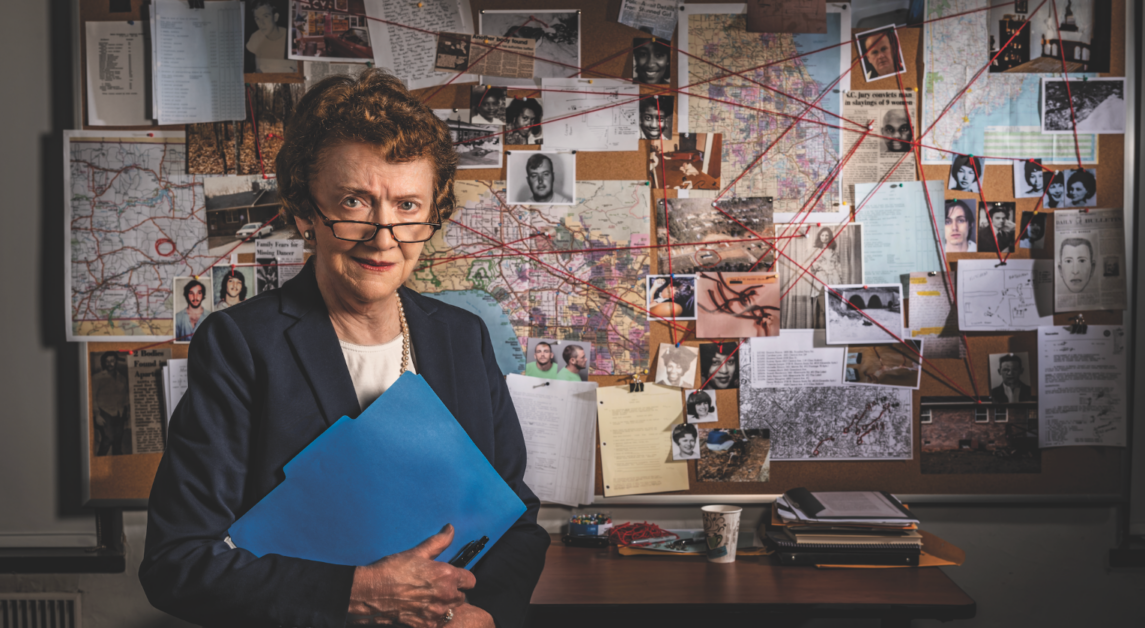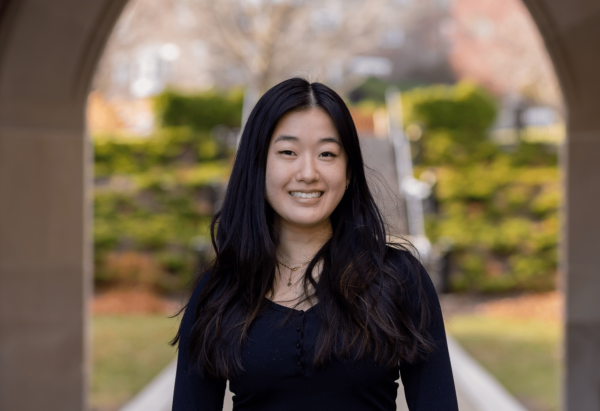Author, nursing professor at Boston College’s Connell School of Nursing, and recipient of the title “Living Legend” by the American Academy of Nursing—Ann Wolbert Burgess does it all.
On July 11, Burgess will make her Hollywood debut as the star of a new Hulu docuseries “Mastermind: To Think Like a Killer.”
The docuseries is inspired by the book A Killer By Design: Murderers, Mindhunters, and My Quest to Decipher the Criminal Mind, coauthored by Burgess and Steven Constantine, associate director of marketing and communications for the Connell School of Nursing.
The book’s purpose was to provide insight into criminal profiling, a field that Burgess was pioneering, Constantine said.
“So I figured, telling [her story] through a book would be a good way of going,” Constantine said. “And [Burgess] agreed—a lot of the agents had written their stories down, but they hadn’t really told the origin story of profiling itself and how that came about. And Dr. Burgess was really the architect of that work. So it’s a great opportunity for her to get that story out to the world.”
Burgess strongly intended for the book to focus on the victims’ perspective and to honor their experiences, Constantine said.
“The thing that Dr. Burgess said to me early on is, ‘I want this book to be about the victims,’” Constantine said. “‘I want it to do justice to the victims, and I want it to serve their memories well.’”
Victimology was not a widely explored field when Burgess first began her career, she said, and she struggled to gather the necessary support and resources to pursue research centered around rape victims.
“Back in the ’70s, it was very hard,” Burgess said. “Either they didn’t want us or they didn’t think it was worthwhile, but it was not easy to get access … those early days it was really, really hard to find the victims.”
Constantine said that Burgess’ unique background in nursing research was what initially caught the attention of the FBI.
“Dr. Burgess was one of the only people who was really doing any research on rape and sexual trauma at the time,” Constantine said. “It was that initial body of work on rape and sexual trauma that caught the attention of the FBI and led to her going down and initially doing a little bit of teaching about that subject, but then getting more involved in a consulting and research role with the agents of the BSU on multiple projects, not just profiling.”
Burgess said her expertise helped the FBI to incorporate a new method of thinking into homicide case studies.
“[The FBI] didn’t realize how much information you could get from the victim,” Burgess said. “So the victimology—the study of the victim—was key and developed, if you will, into one of their primary concepts in working homicide.”
Burgess’ ability to explain complex ideas was helpful in the production of both the book and docuseries, Constantine said.
“She’s really able to transfer very complex ideas and knowledge and experiences and make them very simple and understandable and relatable, which was obviously very helpful in writing the book, but I would imagine that that helped a whole lot when she was talking to agents and trying to get them up to speed as well,” Constantine said.
Constantine said that rather than adapt and “sensationalize” the docuseries, its producers honored Burgess’ story and the truths of the featured cases.
“Everybody we worked with—whether it was a production team at Campfire, the director Abigail Fuller, or the other people we met along the way—they were all very faithful to the story, to Dr. Burgess’ story, as it truly occurred,” Constantine said. “They also shared that goal of wanting to do justice for the victims and not take a more traditional true crime approach, but to really just sort of honor and show these cases.”
The creative process behind the making of the docuseries was extensive, which Constantine said makes the final product all the more worthwhile.
“It’s amazing how much an interview doesn’t make it into the final cut because their interview process is kind of exploratory,” Constantine said. “And they’re trying to figure out, well, ‘How do we tell this story?’ There’s a ton of work that goes into it and I think that just makes it really rewarding when you do see the final product from all that.”
Burgess also said she has seen an uptick of students interested in her forensics and victimology courses at BC.
“As I tell [students], this will impact whatever careers they have—to know something about the legal system and the victim and offender and so forth,” Burgess said. “They’re going to run into it no matter what. So I think that has helped to round out their academic experience.”
Constantine said the docuseries is giving Burgess well-due recognition for her notable work in victimology.
“I just think one of the phrases that was thrown around a lot throughout the making of this [docuseries] was that Dr. Burgess was a bit of a hidden figure in history,” Constantine said. “And I’m surely happy for her that her story gets to be out there now and that people get to learn about her work.”














